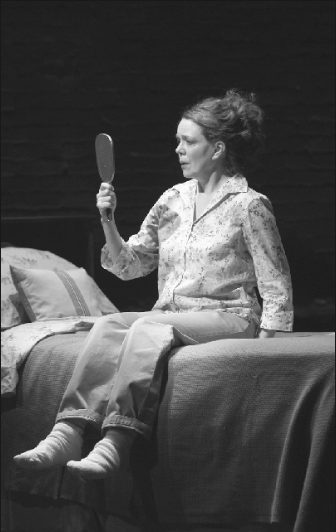By Jerry Tallmer
Fugue (fyoog) n. 1. a musical composition for a definite number of parts or voices, in which a subject is announced in one voice, imitated in succession by each of the other voices, and developed contrapuntally. 2. Psychiatry a state of psychological amnesia during which the subject seems to behave in a conscious and rational way, although upon return to normal consciousness he cannot remember the period of time nor what he did during it; temporary flight from reality.
—Webster’s New World College Dictionary, Fourth Edition
Two women who grew up together, went to school together, shared adolescence together, come face to face in a Chicago psychiatric ward some 20 or 25 years later. One of them has been found wandering the streets of Chicago in bloody and blistered bare feet, not remembering her own name, not remembering anything.
“We call her Mary Smith,” says the senior doctor on the case as he hands that case over to the rebellious younger psychiatrist who, for his own dark reasons, doesn’t want to take it. “She is Caucasian, intelligent, articulate, and generally in good spirits.”
The other woman, Zelda Sterling, has come straight to the hospital after immediately recognizing the “Mary Smith” of a front-page newspaper photograph as the Cecilia Sterling with whom she, Zelda, went to school from age 6 up. Maybe, Zelda thinks, her visit can help restore Cece’s memory.
ZELDA: I thought you might look different. But you don’t … I’m getting gray already. It’s premature, of course. Remember my mother was all gray by the time she was 35?
MARY: No.
ZELDA: You don’t remember my mother was all gray?
MARY: No. And I don’t remember your mother.
ZELDA: You don’t remember my mother?
MARY: No. And who are you?
Thus begins “Fugue,” a strongly evocative, moving, unnerving play by Lee Thuma that’s now in previews toward a March 21 opening at the Cherry Lane Theatre under the direction of Judith Ivey. It reaches New York after a long journey in space and time from California. Now Ms. Thuma and Ms. Ivey were having a spot of post-rehearsal nourishment the other night.
All fugue cases are rooted in guilt — overwhelming, unbearable guilt over real or imagined tragedies. That’s what a psychiatrist friend in Los Angeles told Lee Thuma, then a television writer idled by a Writers’ Guild strike, on the West Coast in the 1980s.
“I paid her her regular $85 an hour to explain fugue to me,” says playwright Thuma. “There’d been a front-page picture in the Los Angeles Times of a Jane Doe who had been found wandering around, barefoot. When her family came to fetch her the next day, the surprise was she didn’t know them. With her bloody feet she was literally running away [from her memories]. In the play, ‘Mary Smith’ has never come to grips with her sharp pain, so it keeps coming back.”
And the secret behind the ugly secret is wish fulfillment: “A mother might say: ‘Oh God, I wish that baby would shut up!’ — and then, from whatever cause, the baby dies. Very often the patient starts a whole new identity.”
As in that great old Garson Kanin-Ruth Gordon-Ronald Coleman movie, “A Double Life”?
“Yeah, but he was just a plain [albeit murderous] amnesiac, it wasn’t fugue.”
If Mary Smith can’t remember her past — which includes a daughter who may or may not be real, and whose name may or may not be Tammy — the past is magically wafted back upon us at several moments with the background music of two golden oldies, “Green Eyes” (Jimmy Dorsey, Ray Eberle, Helen O’Connell) and “Serenade in Blue.” Of course you’d have to be somewhat older, today, than either Mary Smith or her nonconformist young shrink, Daniel Lucchesi, to be swept with the full impact of those old tunes.
“So we made them her mother’s favorites, not hers. Before your time,” she tapped across the net to Judith Ivey.
Ms. Ivey, the recipient of a Tony Award for her 1985 performance in “Hurlyburly,” wanted the press to know — this press — that “Fugue” has won many regional awards.
Has it changed very much on the long journey home to New York?
“Oh yes,” said Lee Thuma. “It’s been optioned five times. Each producer wanted two things: 1) revisions, 2) a list of stars. Judith did a reading of it a couple of years ago — as Mary Smith — and was superb. We wanted her to play Mary now, but” — in pokerfaced Bronx-inflected delivery — “she has these children who are constantly in the way.”
It elicited a cackle from Ms. Ivey, wife of TV producer Kim Braine, mother of 17-year-old daughter Margie and 13-year-old son Tom. “I made this shift in my career from acting to directing when they were growing up,” Ms. Ivey said. “Now my daughter will soon be moving away, and I wanted to be with her until then.”
Mary Smith could take a cue from that, if she could. So could fiery young Dr. Danny Lucchesi. “He’s the true motor of this play,” said the playwright, and the director didn’t disagree.
Ms. Ivey is from El Paso, Texas, and last scored nicely with this playgoer in Israel Horovitz’s “Park Your Car in Harvard Yard.”
Leonora Thuma is from, yes, the Bronx. A one-nighter of hers on Broadway [“The Natural Look,” 1967] turned into a hit television series. Neither one of these ladies could remember — or mayhap had ever seen — a play by Arthur Laurents and subsequent 1949 movie called “Home of the Brave,” in which (undeserved, unearned) guilt makes a World War II soldier — the target of bigotry — block out everything leading up to the death of a buddy in combat.
Some people listen to “Green Eyes.” Some people listen to J.S. Bach. Some people listen to both. It’s called fugue.
FUGUE. By Lee Thuma. Directed by Judith Ivey. With Charlotte Booker, Art Butler, Lily Corvo, Liam Craig, Deirdre O’Connell, Danielle Skraastad, Rick Stear, Catherine Wolf. Now in previews toward March 21 opening at the Cherry Lane Theater, 38 Commerce Street, (212) 239-6200.







































